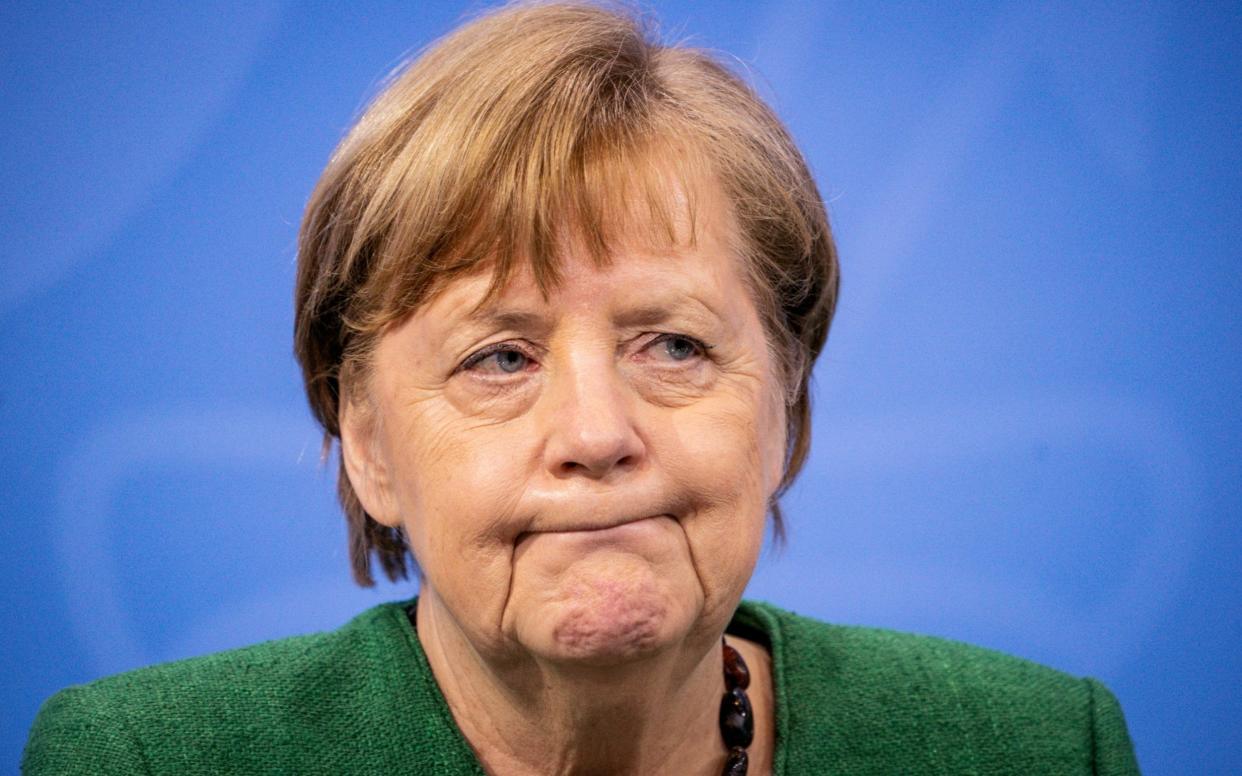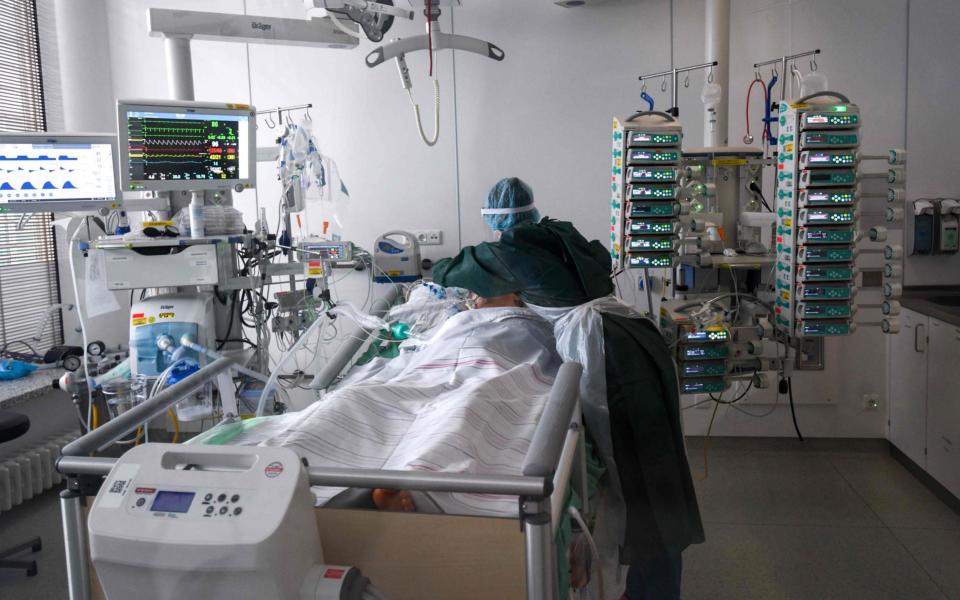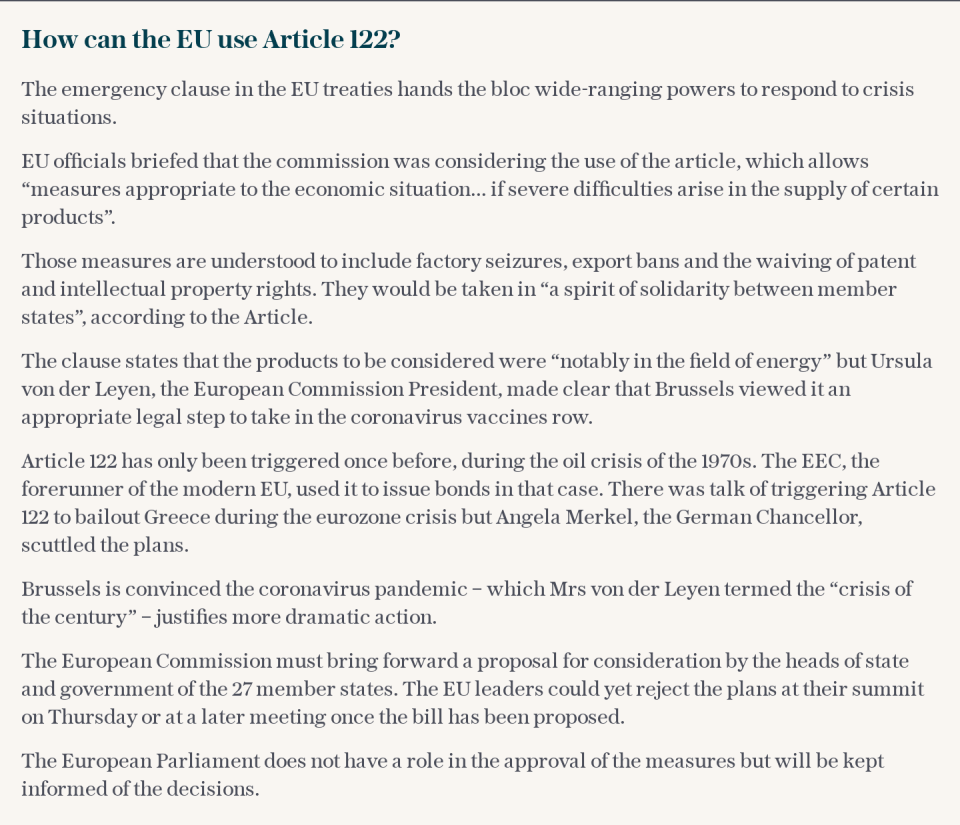Angela Merkel backs EU threat of vaccine ban as Germany lockdown extended

Angela Merkel on Tuesday voiced support for EU chief Ursula von der Leyen’s threat to block AstraZeneca vaccines produced in the bloc from being exported, ahead of a crunch EU summit on the escalating row.
The German Chancellor gave her backing to the head of the EU as she extended her country's lockdown until April 18 to try to break a third wave of the Covid-19 pandemic - which she blamed on the rapid spread of the UK variant.
"I support Commission President Ursula von der Leyen," Mrs Merkel said.
"We have a problem - as everyone knows - with AstraZeneca," she added. "That is why we will decide responsibly.
"We will also seek talks with the British government, as I did with Boris Johnson on Sunday, as he did with Emmanuel Macron, and incidentally, he is also in constant contact with the European Commission."
European officials are furious that AstraZeneca has been able to deliver its UK contract in full while falling short on its supplies to the EU.
In her tough warning to the Anglo-Swedish pharmaceutical giant last Saturday, Mrs von der Leyen said: "That’s the message to AstraZeneca: you fulfil your contract with Europe first before you start delivering to other countries."
The warning comes as the European Union struggles to speed up its Covid-19 inoculation campaign, just as many member states, including Germany, face a third coronavirus wave and renewed curbs on public life.
In talks that ran deep into the night, Mrs Merkel pushed the leaders of Germany's 16 states to take a tougher stance to fight the pandemic, reversing plans for a gradual re-opening of the economy agreed earlier this month after a sharp rise in the infection rate.
"We are now basically in a new pandemic. The British mutation has become dominant," Mrs Merkel told a news conference.
"Fundamentally, we face a new virus of the same kind but with very different characteristics. More deadly, more infectious, and infectious for longer."
Germany started cautiously easing restrictions earlier this month. But the spread of more infectious variants of the virus has pushed up cases, prompting concerns that hospitals could soon be overstretched without further curbs.
The number of cases per 100,000 people over a week stood at 107 on Monday, above the level at which intensive care units will be overwhelmed. More than 3,000 people with Covid-19 are in intensive care.

For five days from April 1, Germans are to stay at home and reduce contacts as much as possible. But the late-night agreement did not include a closing of all stores, including essential shops like supermarkets, which Mrs Merkel had called for.
Big family gatherings will be banned over the holidays, with no more than two households, or up to five people, being allowed to meet. The government will ask churches to hold any Easter services online to avoid gatherings.
Economists said the extension of Germany's lockdown measures would delay a much hoped-for recovery in Europe's largest economy from spring until early summer.
Talks had dragged on for hours as Mrs Merkel and state leaders were at loggerheads over whether to ease restrictions on domestic travel over the Easter holiday season.
Germans can travel freely even amid the pandemic, but hotels and holiday resorts in the country are not allowed to rent rooms to tourists. That leaves travel abroad as the only option for those who are desperate to go on holidays.
"We advise against all travel abroad," Mrs Merkel said.
As the vaccine row continued on Monday, it emerged that Britain was willing to consider sharing Dutch-made doses of the AstraZeneca vaccine with the European Union in a bid to see off Brussels’s threat of a jabs export ban.
Prime Minister Boris Johnson is understood to be prepared to compromise over the distribution of supplies manufactured at the Halix facility in the Netherlands.
It is an option that could defuse the escalating row between London and Brussels over doses, and allow both sides to save face.

While the UK has offered a first jab to more than 50 per cent of the adult population, only 12 per cent of adults in the EU have had their initial dose. The sluggish vaccine rollout on the continent is heaping pressure on European leaders.
An EU diplomat confirmed that an acceptable compromise would be if the UK agreed to “share the delays” in deliveries with the bloc.
Mrs Merkel said both herself and France’s Emmanuel Macron had spoken with Mr Johnson on the issue, and that a summit of EU leaders later this week will address the subject.
Mr Johnson on Sunday called for deeper cross-border partnership on jab programmes, adding: “A vaccination campaign, developing vaccines, rolling them out: these are international projects, they require international cooperation.”
He is understood to have impressed these sentiments, and the importance of abiding by legal contracts, in calls with Mrs Merkel and French President Emmanuel Macron on Sunday.

 Yahoo News
Yahoo News 
